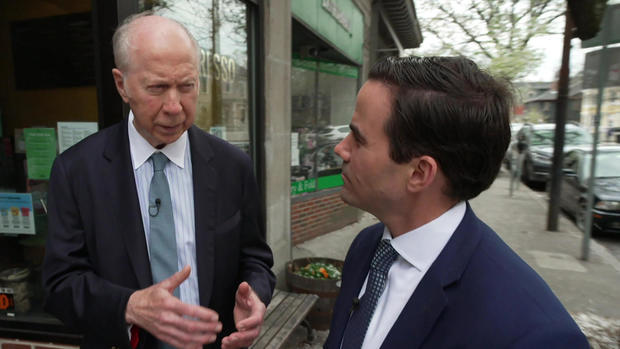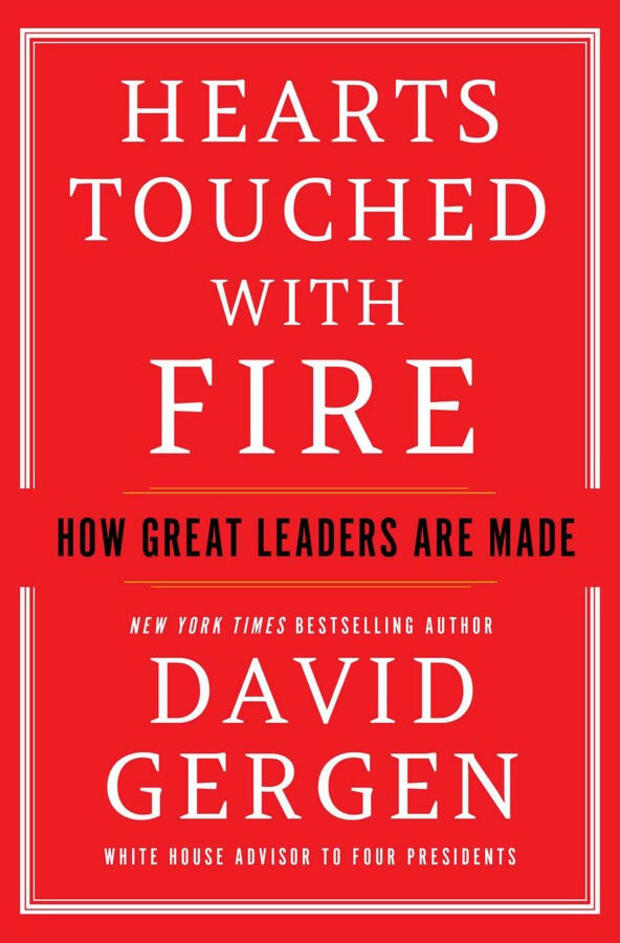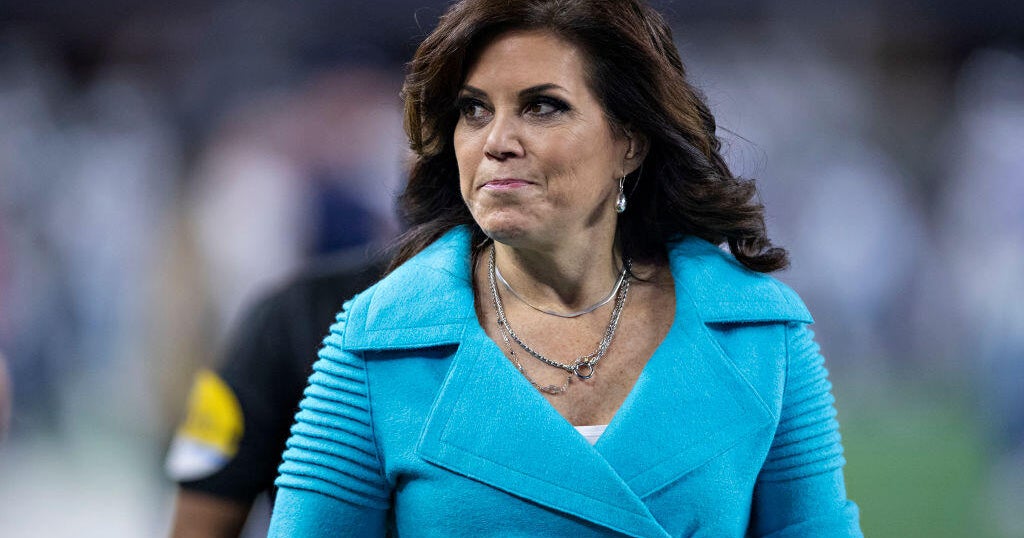David Gergen on the state of our democracy: "We can't continue on the path we're on; it's unsustainable."
David Gergen may be a battle-tested veteran of decades spent advising presidents – Republicans and a Democrat. But Gergen, who turns 80 on Monday, doesn't hold back when asked to describe the state of democracy in 2022: "We can't continue on the path we're on; it's unsustainable," he said. "It has the sense that we're, like, in a car, at midnight, on the edge of a cliff, with rain falling, and no headlights."
Sound alarmist? Well, consider the source: Gergen remains a Washington legend for his clear and steady appraisal of the times, having guided Presidents Nixon, Ford, Reagan and Clinton through critical moments in U.S. history.
CBS News chief election and campaign correspondent Robert Costa asked Gergen, "When you step back and look at all of this, is America in a political crisis or a moral crisis?"
"That's a great question. I think it's a moral crisis," Gergen replied. "I really honestly believe these are moral questions ultimately."
He is reaching out to those who share his concerns with a new book, "Hearts Touched With Fire" (published by Paramount Global's Simon & Schuster). It's a call for a new, younger generation of leaders to seize the reins, and to learn from someone who was so often "in the room where it happened."
Costa asked, "Take me in the room with Richard Nixon. What's a lesson from your time with Nixon that applies today?"
"Nixon was a man who was, in my judgment, the best strategist we've had in the last half-century or so," Gergen said. "But he also had demons inside him that he had not learned to control. And they eventually took him down."
In his farewell speech to the nation, on August 9, 1974, Nixon reflected: "Always remember, others may hate you, but those who hate you don't win unless you hate them – and then you destroy yourself."
"One of the most wonderful images is Nixon getting on the helicopter, " said Costa. "And that night in Washington, life went on."
"It did. Exactly right. I was there. I was on the lawn. I saw the helicopter take off."
"The transition of power worked in August 1974."
"It did, it did."
But, "Not on January 6, 2021."
"Absolutely," Gergen said. "And I think that is just a measure of how much we've changed."
"You've worked for Republican presidents. Do you have faith in Leader McCarthy and Leader McConnell?"
"No; I wish I did," Gergen replied. "I am looking forward to the day, which I think will come. when the Republican Party will regain its balance."
"But the Republicans are not just dealing with an ideological battle; they have a former president still on the march politically in this country, pushing a lie," said Costa.
"Yeah. But there are various signs now that the power of the structure, the Trump-in-charge, that armor is beginning to fall off a little bit. He looks a little more ragged now than he did before."
Gergen's call for new leadership includes our current president.
Costa asked, "Your book says it's time for the current generation of leaders, frankly, to get out, to head for the exit?"
"It's time for the torch to pass," Gergen said. "There are some wonderful people who are in power, you know, mostly, you know, baby boomers. But the truth is, as a generation, the baby boomers – I think even to many a baby boomer – has been a disappointment."
"President Biden, should he run again in 2024?"
"In my judgment, sadly, I think that President Biden's time as an active leader will end with this term, and should end with this term," Gergen said.
"Would the same message apply in the House, and in the Senate? Leader McConnell, Speaker Pelosi?"
"Absolutely."
"They might say to you, 'David, we might be near 80, but we can still do the job. We don't need to go away'?"
"I think the proof is in the pudding on that question," Gergen replied. "If this is the job they say that they're doing so well, I think most people in the country would disagree with that. Our problem is we've had too many leadership failures, not too many successes."
Costa asked, "Is it possible to be a David Gergen today, to serve presidents of different parties?"
"Oh, now listen, I can assure you that there are lots and lots of people out there who are better equipped to do it than I was."
"But there aren't a lot of people going between R and D?"
"There are not lot of people. And then if you wanna see the results, I can show you the scars on my back!" he laughed.
For more than 20 years, Gergen has taught leadership at Harvard's John F. Kennedy School of Government. Like the school's namesake, Gergen is a Navy veteran, and sees military service as a character-forming crucible, something missing from the lives of so many today.
Costa asked, "Do you believe young people are craving some kind of tough, forging experience on leadership?"
"Yes, yes. Absolutely. Yes, I do. And I think you see it in some of the Parkland kids, you know, who've been coming back. I think we see it certainly in the climate movement, with Greta Thunberg. We see it [with] Malala overseas in Pakistan. And the other stream that I would call your attention to are young Black women who are occupying the high ground, you know, on things like Black Lives Matter and the #MeToo movement."
"But just down the street, here in Cambridge, at Harvard, you have so many ambitious students who are saying, 'I have to go into the private sector.' A lot of young people feel like they don't have the time or ability to do national service."
"I agree, there are people who would not do that," said Gergen. "But we haven't offered it in a very big way. We haven't encouraged people to do it. Let's go back to [that]."
He recalled the Depression Era work relief program, the Civilian Conservation Corps, building trails and camp sites and planting billions of trees: "We had 250,000 young men in the woods. It was the most popular program of the New Deal. People [who] serve when they're young, they tend to come back to it."
After years of serving presidents, Gergen now hopes to shape future ones. And while his eyes are fixed on tomorrow's leaders, the lessons of the past are always close at hand.
He spoken of an iconic photo of President Kennedy, leaning over the desk: "Our leadership models are evolving. That Kennedy [image\ really was the Great Man Theory, you know, in a picture. It's sort of at dusk, lonely figure, the burden of the world on his shoulders. Look at Obama: from my point of view, the iconic picture of the Obama presidency is when he's down in the Situation Room, we're closing in on Osama, and there are all these people surrounding him, all of his advisors. We've moved from a singular person theory of leadership to a more collective action. A constructive collaboration becomes essential in a really complicated world that's moving so quickly."
"Leadership can be tough," said Costa.
"It can be very tough. But you can't forget the essentials that go back to the Greeks and Romans, you know, of character, and of capability, and of courage, you know? Those are things that are still necessary today, hundreds of years later."
For more info:
- "Hearts Touched with Fire: How Great Leaders Are Made" by David Gergen (Simon & Schuster), in Hardcover, eBook and Audio formats, available via Amazon and Indiebound
- David Gergen, Harvard Kennedy School
Story produced by Ed Forgotson. Editor: Joseph Frandino.







